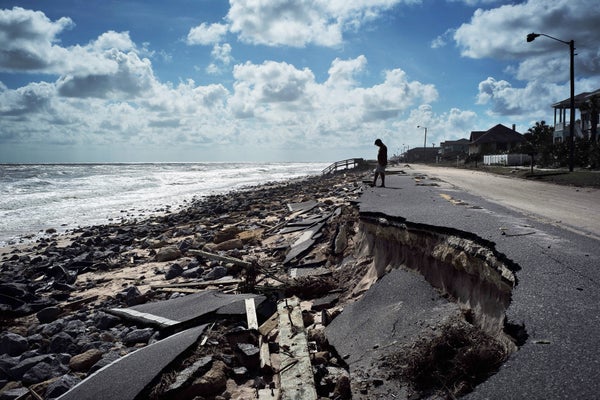Kristina Trotta was working for the Florida Department of Environmental Protection (DEP) in Miami in 2014 when she and her colleagues were called into a staff meeting. “We were told by the regional director that we were no longer supposed to say ‘global warming,’ ‘climate change’ or ‘sea level rise,’” says Trotta, who works on coral reef conservation. “We were finally told we are the governor’s agency and this is what the governor wants, and so this is what we’re going to do.”
Florida’s hush order, along with a similar effort in North Carolina, offers a preview of what will happen if Pres. Donald Trump continues preliminary moves to muzzle climate communication from key federal agencies. The Florida gag effort was part of a broader move by Gov. Rick Scott, a Republican who questions the scientific consensus on climate change. Experts and local officialssay it hampered community efforts to plan for worsening flooding and extreme weather.
Now on the national level all references to climate change have been removed from the White House Web site (except those promising to eliminate Obama climate policies). Trump aides also reportedly ordered the deletion of the U.S. Environmental Protection Agency’s main page on the topic, although those plans were put on hold after word leaked out. Federal agencies have more responsibilities than state authorities, including gathering and analyzing authoritative data about effects on wide areas of the country. If they pull back, the negative effects could be much bigger.
On supporting science journalism
If you're enjoying this article, consider supporting our award-winning journalism by subscribing. By purchasing a subscription you are helping to ensure the future of impactful stories about the discoveries and ideas shaping our world today.
In an e-mail to Scientific American about climate change denial, Florida DEP spokeswoman Dee Ann Miller wrote the state agency “does not have, nor has it had, any such policy in place,” and pointed to efforts to study and address sea level rise. Scott, in fact, did not ban the study of climate impacts outright (and the list of proscribed terms varied, so sea level rise was sometimes okay, sometimes not). The governor, however, made his priorities clear. The Florida government disengaged from active statewide policymaking and planning on sea level rise and related issues, coastal scientists and environmental groups say, even as problems mounted and cities and towns began to organize on their own.
Without statewide leadership and coordination, it is hard to systematically protect the coast, says Leonard Berry, a climate scientist and former director of the Center for Environmental Studies at Florida Atlantic University. If one city builds a seawall, for instance, it may displace the water across the border to the next town over, which may have a different approach. As plans and protections vary, some areas and people will end up facing more risk than others.
Facing a tough reelection campaign in 2014, Scott moderated his environmental platform somewhat. Florida’s water management districts, which are state agencies, have begun grappling with the issue on a statewide level, Berry says. “There is a slow edging toward dealing with what we see here as reality,” he says. “But it has not resulted in any statewide strategy or policies. I wouldn’t rule that out—though it would not be something to deal with ‘climate change’ but rather strategies to deal with specific problems we’re having.”
North Carolina, whose barrier islands are particularly vulnerable to sea level rise, was widely mocked in 2012 when the General Assembly passed a law barring communities from using a report containing 100-year projections of sea level rise—up to 39 inches—in their planning. Three years later a compromise was reached; legislators found a new report with a 30-year time horizon less alarming, and agreed that was permissible.
In the interim, though, coastal planning lagged. Under then-Governor Pat McCrory (R), climate change information disappeared from the state’s Department of Environmental Quality Web site. The legislature altered the makeup of the Coastal Resources Commission, which overseas coastal planning, to remove some scientists and conservation group representatives and replaced them with more business-friendly members.
The trouble in North Carolina is that real estate developers dominate the politics of many coastal resort communities, says Rob Young, director of Duke and Western Carolina universities’ joint Program for the Study of Developed Shorelines. Developer priorities are usually short-term fixes such as seawalls or drainage projects that reinforce an unsustainable status quo and may harm ecosystems. They avoid grappling with more ambitious, controversial fixes—for example, whether to restrict new construction in a vulnerable area. “I don’t think the reticence to do long-term planning for sea level rise is restricted to the North Carolina legislature. I don’t think it’s restricted to North Carolina either,” Young says. “It’s hard to point to anybody on east or Gulf coast[s] doing serious sea level rise planning that involves more than talking about it.” (Louisiana, he noted, is one exception because its rapidly sinking coastal marshes have left communities exposed to dangerous flooding faster than anywhere else in the U.S., forcing the issue.)
The federal government could take steps to fill that void in North Carolina and elsewhere. State and local governments, scientists and nongovernmental organizations all depend on federal data and expertise on climate, the ocean and the coast to make decisions and coordinate their actions. For instance, Broward County in Florida has relied on a series of federal grants to map coastal vulnerabilities, says Jason Liechty, the county’s environmental projects coordinator.
Now Liechty thinks that such programs might be in danger. “All it takes is a couple of ideologically-minded folks in the right place in the administration to cross out that line the budget, or direct resources away from it,” he says.
